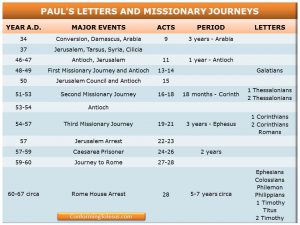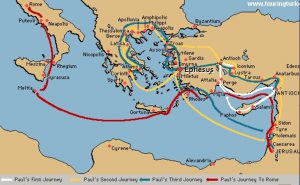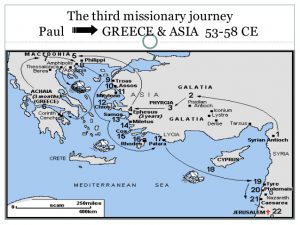1. The Book of Ephesians
The book of Ephesians is one of the chief books of the New Testament. It has been called the “Mount Everest” of the Pauline Epistles. The book takes the thoughts of Paul to their loftiest point. The book of Ephesians is about recognizing our core identity and how we are to live in light of that identity. Ephesians is perhaps the best book on the doctrine of the church.
We are going to do a study series on the book of Ephesians. This is an introduction and outline to the Ephesians study series. A video presentation of the content of this article can be found here on YouTube.
One of the very interesting and exciting aspects of studying books of the bible is the study of history. Let us wear a historian’s hat for a while to understand who wrote the book, when, where, to who, the historical political, cultural & religious context etc.
2. Written By Who
The book of Ephesians starts with the words, “Paul, an apostle of Christ Jesus by the will of God, to…” Ephesians 1:1 and also in Ephesians 3:1, the writer identifies himself as apostle Paul. We can take that the writer is Paul (or dictated by him or written under his guidance).
3. Written To Who
The book is titled “Ephesians”, but Paul did not write the titles.
Ephesians 1:1 says “Paul, an apostle of Christ Jesus by the will of God, To the saints who are at Ephesus…”.
However, there are a few reasons why some scholars believe that it may not have been written to the church at Ephesus alone. One reason is that some early manuscripts do not contain “at Ephesus” in Ephesians 1:1 (look at footnotes in the Bible). The second reason is that Paul planted the church in Ephesus and spent 2 – 3 years ministering, so he must have known the people very well, and yet, there are no personal greetings and nothing specific about what’s going on in that church (which is typically seen in other Paul’s letters). Instead, some impersonal language is used – Ephesians 1:15 “I heard about your faith” or Ephesians 3:2 “you have heard about the administration of God’s grace that was given to me” – as if they knew each other by hearsay.
The book is probably meant as a circular letter to multiple churches in Asia who had received the gospel through Paul’s helpers when he taught at Ephesus (Acts 19:10, Acts 19:22), which is why it is impersonal. The book may have ended up in Ephesus after circulation and the church at Ephesus may have become the custodian of the book (which is why the book has come down to us as the epistle to the Ephesians).
4. When & Where
There are good indications in the letter that Paul was in prison at the time of writing. Ephesians 3:1 “I, Paul, the prisoner of Christ Jesus…”. Ephesians 4:1 “As a prisoner for the Lord…” Ephesians 6:20 “for which I am an ambassador in chains”.
From the book of Acts, we see that Paul was imprisoned in Caesarea (Acts 24) and later in Rome (Acts 28:16, Acts 28:30). Most scholars believe that the book was written during Paul’s imprisonment in Rome (house arrest).
Along with Ephesians, the epistles to Philippians, Colossians, and Philemon are also written from prisons. They are referred to as prison epistles.
A comparison of Ephesians 6:21 and Colossians 4:7 gives the possibility that the letter to the Ephesians was delivered by Tychicus at the same time as the letter to the Colossians.



Based on the assessment that the book was written during Paul’s first imprisonment in Rome, that would make the time of writing AD 61-62.
5. The City of Ephesus
Ephesus is one of the three greatest cities of the Ancient world (along with Rome and Alexandria). It is a principal Roman City of Asia.
Perhaps the most important religious, cultural center in Ephesus was the Temple of Artemis/Diana. It is one of the Seven wonders of the ancient world.
Ephesus is a big, multicultural, political, economic, and religious center; a meeting place for people, goods; and a melting pot of ideas from all over the Mediterranean.
Most of the Greek and Egyptian pantheons were present in Ephesus, but Artemis was the patron goddess. There is no consensus on what the goddess represented, but she seems to have been an amalgamation of the Greek Artemis, the virgin goddess of chastity, and an ancient mother goddess.

Source: https://commons.wikimedia.org/wiki/File:Miniaturk_009.jpg
6. Ministry at Ephesus
Ephesus seems to be quite privileged in the quality and the extent of God’s ministry it received from different prominent people (including Paul). Ephesians had the ministry of Priscilla and Aquila, had the ministry of Apollos. Paul was in Ephesus for 2-3 years, which is longer than another place he has been (the second is in Corinth for 18 months). It is to the Ephesians elders that Paul gave the lengthy speech on Acts 20:16-38. Timothy was there when Paul was in prison for the second imprisonment in Rome. Timothy died a martyr there. John the apostle spent his last days in Ephesus and died there. The first church addressed in the book of Revelation (the seven churches of Asia) is the church at Ephesus.
5.1 Ephesus in Paul’s Second Missionary Journey
Acts 18:19-21 records what may be Paul’s first visit to Ephesus. It was a quick stopover on his way back to Antioch, Syria (second missionary journey). When he was asked to stay, he did not but promised to come back again.

6.2 Ephesus in Paul’s Third Missionary Journey
Paul returned to Ephesus in his third missionary journey and visited the churches that he had established in Galatia and Phrygia along the way (Acts 18:23; Acts 19:1). Paul conducted his ministry in Ephesus and it was the headquarters of his missionary activities for 2 to 3 years (Acts 19:10, Acts 20:31).
Paul’s choice to establish Ephesus as his headquarters made sense as it was the principal Roman city of Asia. As per Acts 19:9-10, he took the disciples with him and had discussions daily in the lecture hall of Tyrannus. Paul and his associates spread the Christian Gospel into the adjacent cities and regions of Asia. He turned the city upside down, enlightening people’s worldview. Paul’s stay at Ephesus also spawned hostility and hatred towards him from some quarters (especially whose livelihood depended on the Temple of Artemis).

6.3 Paul’s Encounters with Ephesians
Acts 19:1-20:1 gives an account of Paul in Ephesus including the success and the hostility. One incident was the near-riot at a theater prompted by the silversmiths’ protest against Paul. The acceptance of Paul’s message by the people (“the word of the Lord grew and prevailed mightily” – Acts 19:20) has threatened the livelihood of the craftsmen whose livelihood is to make statues of mother goddess Artemis and sell them to the tourists and pilgrims.
The jeweler Demetrius and his colleagues provoked thousands of people and met Paul and his associates in the Ephesus theatre and started shouting “Great is Artemis of the Ephesians” creating a near-riot situation (Acts 19:28). The city clerk announced that the courts were open for people who had a complaint and dispersed the crowd.
Many times persecution is not because of opposition on philosophical grounds but because some people think that their livelihood, power, position, influence, etc will get impacted. There is often a misunderstood concern that one’s culture changes when a person accepts Christ, which is not true. A unique aspect of the Christian faith is that it a relationship with God and everyone brings their culture with them (as long as it is morally good or neutral).
7. Organization of the Epistle to Ephesians
As with many of Paul’s epistles, the book of Ephesians can be neatly divided into two basic sections:
Ephesians 1-3: Our position and identity is “In Christ” (Theological/Doctrinal Section)
Ephesians 4-6: How we ought to live in light of that position/identity (Practical Section )
8. Watchman Nee – Sit, Walk, Stand
Watchman Nee’s commentary based on the book on Ephesians is titled “Sit, Walk, Stand”. The title is a good summary of the book of Ephesians.
Our/church’s position in Christ (sitting) – Ephesians 1-3
Our/church’s conduct in the world (walking) – Ephesians 4-6:9
Our//church’s attitude in spiritual warfare (standing) – Ephesians 6:10-24
It covers the three aspects of the believer – to God, to fellow humans/church, and to the enemy.
“The Christian life consists of sitting with Christ, walking by him and standing in him. We begin our spiritual life by resting in the finished work of the Lord Jesus. That rest is the source of our strength or a consistent and unfaltering walk in the world. And at the end of a grueling warfare with the hosts of darkness we are found standing with him at last in triumphant possession of the field.”
– Watchman Nee
8.1 Exhortation to Sit
Paul says in Ephesians that we are seated with Christ in heavenly places. It is a position in Christ. We are seated at rest. We are not laboring for our salvation. We are not psyching ourselves up (like how some self-help gurus may tell us – to constantly tell ourselves that we are worthy etc). It is what God has done for us. We are saved and are transformed, not because of anything we have done, but by grace, by faith, by accepting the love of God, and submitting to His transformative power. We are at rest because of what Christ did, we are raised with Him to sit in heavenly places (Ephesians 2:6). It is an exhortation to sit to be at rest. Just occupy the position that God has put us in.
8.2 Exhortation to Walk
The walk is to live based on the awareness of the position that God has given us and to progress into the likeness of Christ. It is a reasonable response to the truth of what Christ has done. We need to walk worthy of the calling and the position that God has given us through Christ. God calls us to be part of a community that is called to live every day for God’s purpose.
The challenge for the believers is to live worthy of a calling like that. Paul says that when you are in Christ, you become a new person. We basically get a new identity. As a result of getting a new identity, we live differently. That is why in Ephesians we see many statements like “formerly you are… but now you are…” (Ephesians 2:4, Ephesians 2:13, Ephesians 4:22-24, Ephesians 5:8). Paul exhorts us to take off the old way of life, put on the new way of life (Ephesians 4:22)
We get enthralled with the Person and the work of Jesus Christ and the relationship to Christ. That is what changes us.
I always used to wonder what this transformation is about. Is it some kind of supernatural miracle that we cannot understand? It is, but I think we can understand it as having to do it with the relationship to Christ – the new love in Christ that does the transformation.
When you have a new relationship that truly matters to you, all of a sudden behavior changes – in relationships that matter. There is a joke – “A man marries a woman hoping that she won’t change, but she does. A woman marries a man hoping he will change after marriage, but he won’t.” Jokes apart, intimate loving relationships do make behaviors to change.
Understanding our relationship to Christ causes us to worship, causes our hearts to be moved. That deep affection in Christ, realizing what He has done on our behalf, that changes us. We end up living naturally in Ephesians 4-6 as we progress into the likeness of Christ.
Walk Worthy of the Calling (4:1-3)
Walk in Unity (4:4-16)
Walk in Holiness (4:17-32)
Walk in Love (5:1-7)
Walk in Light (5:8-14)
Walk in Wisdom (5:15-17)
Walk in the Spirit (5:18-21)
Walk in Relationship (5:22-6:9)
8.3 Exhortation to Stand
This is in the context of spiritual warfare. Ephesians 6:10 says, “Finally, be strong in the Lord and in the strength of His might. Put on the full armor of God, so that you will be able to stand firm …”
It is an exhortation to stand strong, to put on the armor of God – for we do not fight against flesh and blood but against principalities and powers. It is walking into battle, into danger, into spiritual warfare. We have to stand and withstand the opposition of the enemy.
9. Themes in Ephesians
Let’s look at some of the themes in the book of Ephesians.
9.1 Our Core Identity
The book of Ephesians presents a relationship to Christ, tells how preciousness we are to Christ, God’s exalted place and purpose for us. Paul encourages us to appropriate the spiritual blessings in Christ.
Many people base their identity on performance, income, education, popularity, success, power, gifts, talents etc. All these things go up and down (by many factors and circumstances, including the natural aging process – often plunging us into an identity crisis!). While we ought to strive for excellence in all fields, the source of identity should be only our position in Christ. Otherwise, we will be dissatisfied because we are made for a relationship with God through Christ. Paul uses the phrase “in Christ” about 36 times in Ephesians. Our identity is found in knowing Him and in being in Him.
An identity crisis is the source of many of our problems. Knowing who we are, is therefore is important.
“What makes a person a person is her (or his) capability of interpersonal relationship. In fact, we derive our most fundamental sense of identity by relating to God and other human beings. Moreover, the identity that we seek from impersonal entities such as achievement, fame, pleasure, and possessions – the hallmarks of today’s consumerist, shopping-mall existence – can be extremely inadequate and frustrating.” – LT Jeyachandran
9.2 God’s Masterpiece of Reconciliation
The main theme of Ephesians is the church as God’s masterpiece for reconciliation. The church is not a building, not an organization, not a place we meet once a week, certainly not a show of strength, but the corporate unity of people who live in spiritual union with their savior. We become “one new man” (like how the Jew and the gentile became one in Christ). In Christ, all barriers are removed. We are reconciled to God and to one another through Christ.
Reconciliation with God results in reconciliation with others (Ephesians 5:1-6:9). This witness of unity among the followers of Jesus convicts the world (John 13:34-35). The church is not a friendship club but a showcase of unity, reconciliation, and sacrificial building of one another that is made possible through Christ. If the church is not based on right godly relationships in Christ, it degenerates into a social club with groups, sub-groups based on status, money, power, similar backgrounds etc. We see that in happening many fellowships.
Jesus is our peace. He destroys barriers and the dividing walls of hostility.
“Holiness is Relational” – LT. Jeyachandran
The Pharisees of Jesus’ time claimed to love God, but they never loved people. Jesus exposed their supposed love for God as hypocrisy. Even today we see people who talk about God all the time but are always bitter, angry, dissatisfied, and gossip and tell bad things against people, etc. This happens when they use God and religiously just to be praised by people, for selfish intentions, and to build up one’s own stock/empire.
The commandments that God gave are God’s requirement in terms of relationships – with Him and with one another. Holiness is therefore not a stand-alone ascetic quality. It is not about sitting in a room alone or in a cave without internet or sleeping on a cold floor trying to get away from impure thoughts etc. It is not about how regularly one goes to a church service or whether one is carrying a bible, or how long one prays, or how much money one gives or how much fundraising one can do, etc. Instead, it is about reconciled relationships with others, how one speaks about others, how one is engaged in building up one another. Everything else comes later.
Sometimes it is easier to love our enemies than to love the people in the church community (or even spouses – I think it was Andy Stanley who noted that a few months or years into a marriage, we start blaming the spouse for all our problems!). The closer we get to people, the more we see the difficult aspects of their personalities – their egos, annoying behavior, rudeness, selfish attitudes, meanness, anger, find out about their gossip on us, etc. That is why relationships are difficult. Every married person knows the difficulty. Everyone who tried to build unity in the church knows the issue. If you think your gifts and skills are not utilized well, try using your gifts to build reconciliation in the church. You will never complain about the lack of utilization of gifts again!
The unity/reconciliation is not possible by a forced outward organization, but by God creating a new life within the believer (Ephesians 4:24-31). Paul asks to take off the old way of life and put on the new way of life. He gives practical exhortations like – Be kind, compassionate, forgiving like Christ (Ephesians 4:32).
The transformed behavior is the evidence of Christ in you (not how much you talk about God). For example, our speech will be different. We start speaking to one another and speaking about one another in a different way: “Do not let any unwholesome talk come out of your mouths, but only what is helpful for building others up…that it may benefit those who listen” (Ephesians 4:29). No more gossip or pulling down, scheming against others, etc.
As a result of this study, even if there is one area that we improve in our walk – for example, our speech – the study is worth it. We need to keep feeding our souls with the truth.
The local church, fellowships, home groups, life groups where you can discuss problems. (not a friendship club, the focus is on building up reconciliation, building up one another, build collective burden).
The biggest issue of the church is not lack of skills, or lack of people with debating skills, not even lack of individuals who are spiritually focused. There is also no shortage of people who get all emotional and worked up and angry if some person who does not know Christ abuses Christianity (We don’t need that – instead we should always be prepared to give the reason for the hope, with gentleness and respect 1 Peter 3:15 ).
The biggest issue of the church is our failing in true holiness, which relational. Lack of proper reconciliation in the body of Christ is our issue. When the world sees the church, they are not seeing solutions. Instead, they see the same problems of hostility, conflict, failing marriages, parenting problems, immaturity, depression, etc. The need of the hour is to use our gifts in a sacrificial way and non-self-serving way for the reconciliation and building up of one another in the church. Hope the study of Ephesians brings us closer to addressing these issues. It should change us from being problem creators (or those who just sit on the sidelines) to problem solvers.
That is why the One Another statements in the bible are very relevant.
9.3 Spiritual Warfare
Paul alerts the believer to the spiritual warfare against principalities and powers (not between people). The followers of Jesus have to be Christ’s soldiers and God’s instruments. We are exhorted to stand strong and be equipped to put on the Armor of God (Ephesians 6:14-18)
References and Image sources:
https://jorgeschulz.wordpress.com/tag/ten-commandments/
https://www.insight.org/resources/bible/the-pauline-epistles/ephesians
https://www.conformingtojesus.com/charts-maps/en/paul%27s_letters-journeys_chart.htm
http://www.purifiedbyfaith.com/Ephesians/Ephesian_Introduction.htm
https://www.ccel.org/bible/phillips/CPn18Philemon.htm
https://www.slideshare.net/donpalmer/nt-session-5
TED Talk – Mastery: How to Learn Anything Fast | Nishant Kasibhatla
https://deeperchristian.com/ephesians01/
Lectures by Steve Gregg
Lectures by Tony Merida

